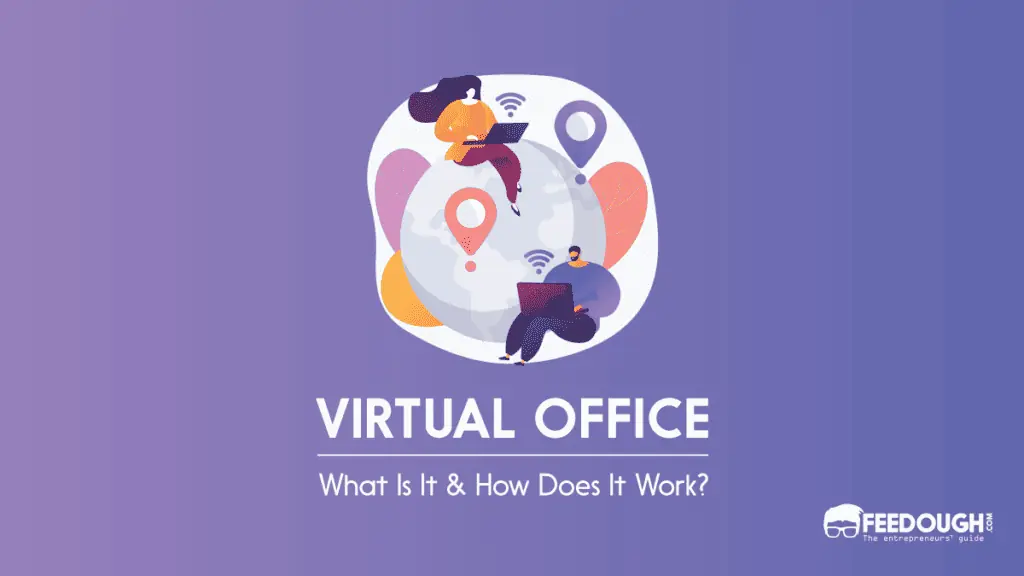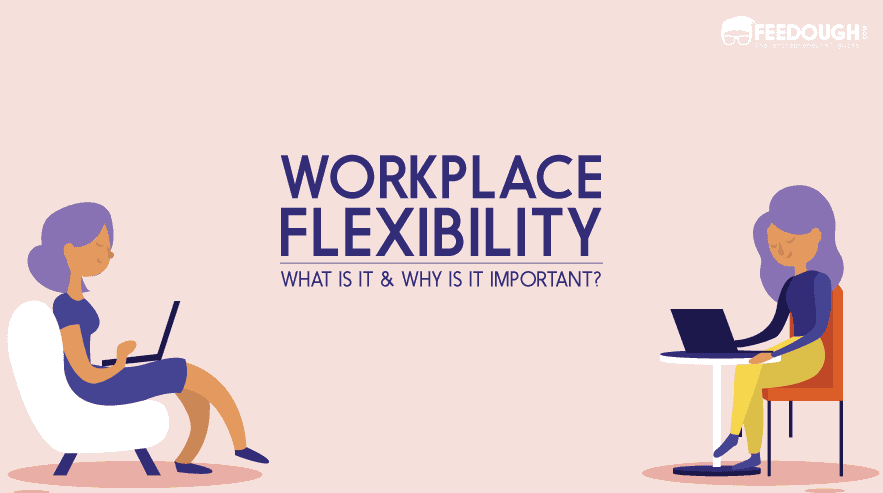The way we go to the office today isn’t how it used to be before. Over the years, companies started encouraging their employees’ comfort and creativity – say, a four-day workweek. Many other things about going to the office have changed over time. In fact, the very idea of going to the office has changed. The concept of virtual offices makes it possible to sit anywhere in the world and work remotely while having an office address in some other part of the world!
People usually scratch their heads thinking about what precisely a virtual office is. An actual place? A service? A technology? A coworking office space? Or something in between?
The answer to all these questions is a partial yes.
A virtual office can serve different purposes, and in this article, we delve into what they are, how they work, and why one should use them.
What Is A Virtual Office?
A virtual office is a service that enables businesses to work remotely by providing them with a business address, internet-accessible business services, work and meetings space, and required technology without the business bearing the expenses of a physical office.
In simple terms, it provides businesses with the perks of a traditional office – office and mailing address, telephone number, administration and communication services, optional access to workspaces and meeting rooms – without the business renting, leasing, or buying a physical office space.
Virtual offices are best suited for teams not confined to a geographical area and businesses working remotely. But they are not just limited to providing just an official business address. They have their own business model that caters to the special needs of remote businesses.
How Does A Virtual Office Work?
Virtual offices work as usual office spaces in terms of the contract. Businesses rent a virtual office space like they do with a physical office space. However, unlike the latter, these offices don’t provide dedicated physical spaces.
Generally, virtual offices are physical office spaces or coworking spaces that expand their business model by lending their address to businesses. They provide businesses with an address they can use for official paperwork and receive mails. Moreover, some office spaces can also include occasional use of meeting rooms and other value-added services like receptionist services, lockers, etc., in their packages.
What Does A Virtual Office Provide?
Virtual offices’ packages and offerings differ for different brands. These offices provide a combination of both physical and virtual services.
Physical services include:
- Business address: It is the recognised address at a physical office building that a business leases to be its official or mailing address. Businesses can use this address for official purposes like business licensing, LLC setup, marketing, and mailing, amongst other things.
- Mail management: The office provides a facility to manage, store, or forward physical mails directed to the business or its employees.
- Onsite receptionist: Receptionists take care of the mail processing (receiving and forwarding them to alternate addresses) and help set things up in case of an arrangement of meetings in the office.
- Meeting rooms and office space: The users also have optional access to a physical workspace with meeting rooms, day desks, and private offices. The access is arranged based on the number of hours or days. Some virtual office plans have a set number of hours included in their monthly fee, while others charge for meeting room rentals on an hourly basis.
- Copy and print facilities: Akin to other traditional offices, a virtual office centre has onsite copy and printing facilities. These services are usually available for a small additional fee.
Virtual or remote services provided by virtual offices include:
- Business phone system: It is a cloud-based phone system with various features such as an auto attendant, extensions, custom greetings, caller menus, etc. Companies can also select a business number with a local or toll-free area code.
- Remote receptionist services: It offers remote basic customer services, and calls are answered in the company name, screened, and forwarded to the respective voicemails.
- Digital mail service: Some virtual office centres also provide digital scanning services to view a scanned copy of their mail before getting it forwarded or trashed.
- Virtual assistant: Virtual assistants support businesses by managing various responsibilities, from scheduling meetings to handling their social media accounts.
How Much Does A Virtual Office Cost?
Typical costs for using a virtual office include an initial setup fee of around $100-$150 and a standard fee of $50 to $100 per month for essential services. Additional services cost more. The exact costs vary depending on multiple factors like the provider and the business location; that is, costs for getting a virtual address in India’s New Delhi will be lesser than a virtual address in California.
Who Needs A Virtual Office?
With new business models rapidly replacing traditional models, business needs are also changing. Today, businesses work remotely with global teams. While some have traditional offices, the advancement in internet technologies has made it possible to work without a physical office. This is where the virtual office concept comes in place. The concept has a great use-case among the new generation of businesses that include:
- Geographically scattered teams: Teams that are not confined to a geographical location often use virtual addresses to register their business and get official work done.
- Virtual entrepreneurs: This concept best suits freelancers, business consultants, bloggers, digital marketers, and digital nomads who work from anywhere but need an address for official and mailing purposes.
- Startups and garage businesses: Often, startups and small businesses start their operations from home. But having a home address on Google search or website isn’t professional. Hence they go for virtual office addresses.
- Registered businesses with remote teams: Registered businesses with remote teams often use virtual office services to avail the benefits of virtual addresses and add-on services.
Advantages Of A Virtual Office
Virtual offices come with benefits that lure many people to move away from usual physical office scenarios. These are:
- Economical: Virtual offices do away with owning or leasing a traditional office. Their low prices make it easier for startups to keep their overheads low. It also reduces the financial risks of testing a new product or service or dipping one’s toes into a new marketplace.
- Requires minimum commitment: The commitment is minimal since contract terms start every month, in three months or more. This provides the flexibility of backing out with minimal loss.
- Adds to professionalism and increases brand image: Customers want to know whom they are dealing with, and a professional address helps instil more confidence in them. It gives them something beyond a smart logo and a good website. Moreover, the ability to meet people in person in professional meeting rooms reinforces the legitimacy of the business in the eyes of the clients and customers.
- Convenient: A virtual office allows running a business remotely from anywhere in the world with great speed and simplicity. When a face-to-face meeting is required, a virtual office provides the convenience of a more professional environment and a meeting room at the business address. It also gives the employees more flexibility to work, reduces travel expenses, and thus leads to greater productivity and job satisfaction.
- Reduces legal liability: Using a virtual office helps reduce legal risks since it enables legal entities to differentiate between personal and business assets.
- Boosts SEO(Search engine optimisation): Since virtual offices allow a business to have an office address anywhere globally, it is an affordable way to optimise for web searches when a prospect searches for businesses near their location. For example, a digital marketing agency operating from New Delhi can optimise well to rank on the search keyword “digital marketing agency in Sydney” if the agency has a virtual office in Sydney.
Disadvantages of using a virtual office
It is essential to be aware of the drawbacks that might come with adopting virtual offices. These are:
- Some businesses might need a full-time or more permanent workspace since some tasks are better performed in a physical presence.
- Access to the office space after regular working hours might not be facilitated by virtual service providers.
- There might be short delays in receiving mails sometimes due to the need for their processing by the onsite team.
Is A Virtual Office Worth It?
Cost savings with easy setup and building a market presence can sound enticing to a lot of brands. However, on weighing these benefits with cons like an unmanageable remote team, late delivery of mails, messy teamwork, one can easily get into a dilemma of whether or not they should go for a virtual office.
To get the answer, one must weigh the pros and cons and consider the type of business they have before choosing a virtual office.
Virtual offices don’t suit brands that require the physical presence of teams to get the work done and those that need physical presence like courier companies.
But it can be a boon for a business that can fully operate digitally with the help of remote teams.
Are Virtual Offices Legal?
Like traditional physical offices and coworking spaces, virtual offices are legal in almost all countries worldwide. This is because they are registered entities that lend their address only after fulfilling the legal requirements of every country.
Bottom-Line?
While virtual offices were more a concept than reality a few decades ago, today’s businesses have evolved to embrace them. Looking into the not very distant future, it seems highly likely that there will be a paradigm shift from the full-time permanent brick-and-mortar job requirements.
With the advancement in technology by the day, workplaces are evolving more rapidly, and virtual offices would become more of a rule than an exception.
Go On, Tell Us What You Think!
Did we miss something? Come on! Tell us what you think of this article in the comments section.
An economics aficionado and a researcher at heart, Shrishti has also worked as a consultant to assist startups and NGOs in varied verticals. When not working, she is a passionate dancer and painter.








